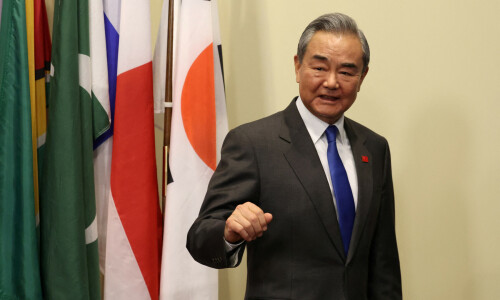ISLAMABAD: Chief Justice of Pakistan Umar Ata Bandial observed on Friday that the Constitution did not bind a lawmaker to declare allegiance to a political party.
While referring to an argument by Attorney General for Pakistan (AGP) Khalid Jawed Khan in which he had tried to equate defection under Article 63A of the Constitution in the presidential reference with that of “Khayanat” (dishonesty), the CJP observed that Khayanat was a serious offence and the holy Quran speaks of serious punishment for it.
But the question demanding attention is: whether the Constitution speaks of dishonesty to a political party or to the constituents who elect legislators.
The AGP will have a good case if he established that those who switched their loyalty had betrayed their voters, the CJP observed.
He made the remarks during the hearing by a five-member bench of a presidential reference seeking interpretation of Article 63-A of the Constitution.
The CJP wondered why parliament chose to restrict disqualification to de-seating of a member even though it had the powers to add more provisions like a life-long bar from being elected to any legislature.
Was there some fear behind this omission, Chief Justice Bandial wondered.
He observed that through the 18th Amendment, parliament had even added punishment to Article 62(1)(f), but made it conditional upon a declaration by a court of law. The observation came when the AGP highlighted that some of the members who had taken refuge at the Sindh House were elected on reserved seats under Article 51(6) of the Constitution, which talks of special seats for women and minorities proportionate to the number of seats won by a party.
Justice Jamal Khan Mandokhel wondered whether members were bound to follow the dictates of their party head if the prime minister loses trust of the majority or if an action went against the national interest.
“Would it not be better for the President to call a meeting of all the parliamentary parties for evolving a consensus than instituting a reference before the court,” Justice Mandokhel wondered.
“This is what former President Ghulam Ishaq Khan used to do — holding meetings to oust the government of the day,” the AGP quipped.
Justice Mandokhel also observed could the court exercise judicial function while sitting to interpret Article 63A in the advisory jurisdiction especially when the Supreme Court cannot even add a full stop in the constitution.
“What is the issue with the President that he is seeking our opinion,” Justice Mandokhel observed, stressing that he would be the last person to favour ‘Lotas’ (turncoats). Justice Mazhar Alam Khan Miankhel observed that the government was apprehensive about defection when actual defection had taken place.
Justice Ijaz-ul-Ahsan spoke of a membership form which requires an undertaking that the member would be bound by the party discipline and must face consequences in case of breach of trust.
An occasion has arisen as the President had sought interpretation of certain provision of the constitution and it becomes the job of the top court to interpret the same. “We may refuse to interpret as the constitution court or interpret if there are certain confusion or return the same,” Justice Ahsan observed.
The AGP said the laws were made before the crime was committed and explained that the requirement of oath of the prime minister, as well as lawmakers, were different. Moreover, the party issued a certificate for the issuance of a symbol for election by the Election Commission of Pakistan (ECP) if the member subscribes to the party manifesto.
The AGP argued that in Pakistan, Bangladesh and India, the stature of leaders were such that parties thrive on an individual’s name. To substantiate, the AGP cited the example of senior counsel Raza Rabbani who cried his heart out when the military courts were being established through a constitutional amendment, but chose to vote along party lines.
Any disagreement on policies in the party should not translate into vote against the prime minister, the AGP stated, adding unless “you sever your relationship with the party you belong to, you cannot create relationship with any other party”.
“if someone’s conscience has awakened suddenly, the person should write two lines and simply resign since defection is not a badge of honour.”
Let parliament decide by evolving a consensus, observed Justice Mandokhel.
The attorney general contended that the Constitution always speaks through the Supreme Court.
Published in Dawn, March 26th, 2022















































